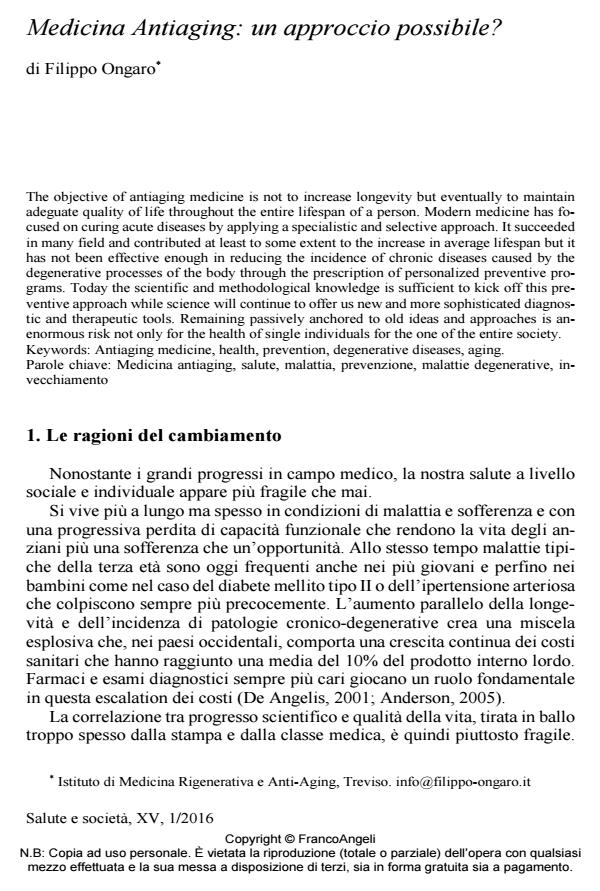Medicina Antiaging: un approccio possibile?
Titolo Rivista SALUTE E SOCIETÀ
Autori/Curatori Filippo Ongaro
Anno di pubblicazione 2015 Fascicolo 2016/1 Lingua Italiano
Numero pagine 10 P. 154-163 Dimensione file 391 KB
DOI 10.3280/SES2016-001011
Il DOI è il codice a barre della proprietà intellettuale: per saperne di più
clicca qui
Qui sotto puoi vedere in anteprima la prima pagina di questo articolo.
Se questo articolo ti interessa, lo puoi acquistare (e scaricare in formato pdf) seguendo le facili indicazioni per acquistare il download credit. Acquista Download Credits per scaricare questo Articolo in formato PDF

FrancoAngeli è membro della Publishers International Linking Association, Inc (PILA)associazione indipendente e non profit per facilitare (attraverso i servizi tecnologici implementati da CrossRef.org) l’accesso degli studiosi ai contenuti digitali nelle pubblicazioni professionali e scientifiche
The objective of antiaging medicine is not to increase longevity but eventually to maintain adeguate quality of life throughout the entire lifespan of a person. Modern medicine has focused on curing acute diseases by applying a specialistic and selective approach. It succeeded in many field and contributed at least to some extent to the increase in average lifespan but it has not been effective enough in reducing the incidence of chronic diseases caused by the degenerative processes of the body through the prescription of personalized preventive programs. Today the scientific and methodological knowledge is sufficient to kick off this preventive approach while science will continue to offer us new and more sophisticated diagnostic and therapeutic tools. Remaining passively anchored to old ideas and approaches is anenormous risk not only for the health of single individuals for the one of the entire society.;
Keywords:Medicina antiaging, salute, malattia, prevenzione, malattie degenerative, invecchiamento
- Aderem A. (2005). Systems biology: its practice and challenges. Cell , 121: 511-13. DOI: 10.1016/j.cell.2005.04.020AlbrechtG.L.,FitzpatrickR.,ScrimshawS.C.(acuradi)(2000).Thehandbookofsocialstudiesonhealth&Medicine.London:SagePublication
- Anderson G.F. (2005). Medicare and chronic conditions. New England Journal of Medicine, 353: 305-08. DOI: 10.1056/NEJMsb04413
- Bell J. (1998). The new genetics in clinical practice. British Medical Journal, 316(7131): 618-20. DOI: 10.1136/bmj.316.7131.61
- Branch W.T. (2000). Is the therapeutic nature of the patient-physician relationship being undermined? Archives of Internal Medicine, 160: 2257-60. DOI: 10.1001/archinte.160.15.225
- Chiong W. (2001). Diagnosing and defining disease. Journal of the American Medical Association, 285(1): 89-90. DOI: 10.1001/jama.285.1.89-JMS0103-2-
- De Angelis C.D., Fontanarosa P.B., Flanagin A. (2001). Reporting financial conflicts of interest and relationships between investigators and research sponsors. Journal of the American Medical Association, 286(1): 89-91. DOI: 10.1001/jama.286.1.8
- Dubois R. (1987). The mirage of health. New York: Rutgers University Press
- Duris P., Gohau G. (1999). Storia della biologia. Torino: Giulio Einaudi Editore
- Fries J. (1980). Aging, natural death and the compression of morbidity. New England Journal of Medicine, 303: 130-5. DOI: 10.1056/NEJM19800717303030
- Grumbach K. (2003). Chronic illness, comorbidities and the need for medical generalism. The Annals of Family Medicine, 1(1): 4-7. DOI: 10.1370/afm.4
- Klatz R., Goldman R. (a cura di) (2003). The Science of Anti-Aging Medicine. Chicago: A4M Publications
- Liotta L.A., Kohn E.C., Petricoin E.F. (2001). Clinical proteomics: personalized molecular medicine. Journal of the American Medical Association, 286(18): 2211-14. DOI: 10.1001/jama.286.18.221
- OMS (1948). Preamble to the Constitution of the World Health Organization as adopted by the International Health Conference, New York, 19-22 June, 1946
- Rees J. (2002). Complex disease and the new clinical sciences. Science, 296: 689-701. DOI: 10.1126/science.296.5568.69
- Rose M.R. (1999). Can human aging be postponed? Scientific American, 281: 106-111. DOI: 10.1038/scientificamerican1299-10
- Rothenberg R., Becker K., Hart K., Wise K. (2007). Forever ageless: Advanced Edition. Santa Fe: California Healthspan Institute
- Tosato M., Zamboni V., Ferrini A., Cesari M. (2007). The aging process and potential interventions to extend life expectancy. Journal of Clinical Interventions in Aging, 2(3): 401-12
- Wagner C. (2001). Aging versus antiaging: geriatrics is in trouble while antiaging medicine takes off. The Futurist, 35(5): 8-9
Filippo Ongaro, Medicina Antiaging: un approccio possibile? in "SALUTE E SOCIETÀ" 1/2016, pp 154-163, DOI: 10.3280/SES2016-001011